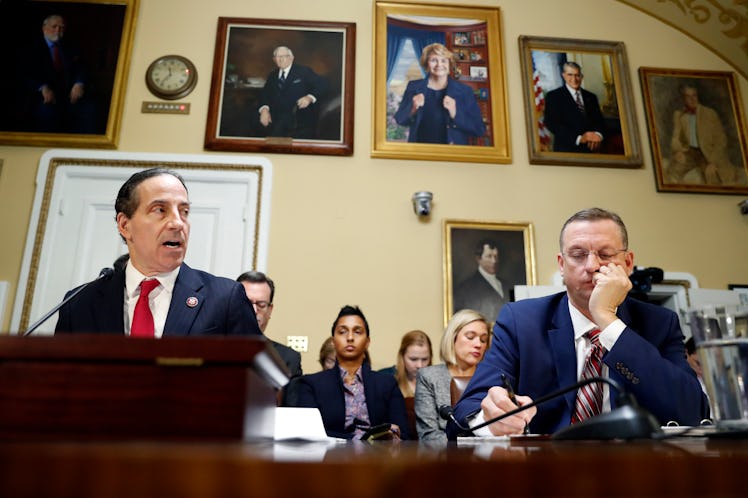
Here's What The Constitution Really Says About Impeachment
Dec. 17, the House Rules Committee gathered to figure out the rules to debate the impeachment vote for President Donald Trump. This is pretty standard Congressional procedure — but believe it or not, it wasn't established by the Constitution. As the Democratic-led House prepares to vote on Trump's impeachment on Dec. 18, it's worth noting that the Constitution doesn't say a whole lot about impeachment.
Some Republican leaders have argued Democrats' impeachment inquiry into Trump is unconstitutional, but in fact, the Constitution just doesn't provide many overt guidelines for impeachment. In fact, the full text only mentions impeachment six times. The Constitution, for the most part, lays out who can be impeached, why, and who can do it — and then leaves Congress to fill in the blanks. Article 2, Section 4 of the Constitution states that "The President, Vice President and all civil officers of the United States, shall be removed from office on impeachment for, and conviction of, treason, bribery, or other high crimes and misdemeanors." However, the Constitution doesn't expressly define "high crimes and misdemeanors" (something which was probably an intentional choice).
Article 1 of the Constitution also outlines who gets to impeach a president: Congress. Sections 2 and 3 of this article dictate that the only the House of Representatives can officially impeach an official. Meanwhile, only the Senate can carry out the impeachment trial, which comes after impeachment. Senators must obtain a two-thirds majority vote in order to remove a president from office. The Constitution also lays out Congress' ability to punish an impeached president. An impeached president must be removed from office if convicted, but beyond that, all Congress can punish an impeached official with is a ban from holding office again. Section 3 of Article 1 says,
Judgment in cases of impeachment shall not extend further than to removal from office, and disqualification to hold and enjoy any office of honor, trust or profit under the United States: but the party convicted shall nevertheless be liable and subject to indictment, trial, judgment and punishment, according to law.
Did you catch the one important "nevertheless" in that? A president who has been impeached and removed is able to be charged for any crimes he or she may have committed. A sitting president is generally not able to be charged with crimes, per standing policy. So, while there's been speculation that Trump could go to prison if he is impeached, this part of the Constitution makes it clear that Congress has no control over that.
The one explicit thing the Constitution does lay out about the proceedings for impeachment is who presides over the Senate trial of a president. That, per the Constitution, is the Chief Justice of the Supreme Court — currently John Roberts, who was appointed by President George W. Bush in 2005.
The Constitution only makes a couple of other minor references to impeachment. In Article 2, Section 2, for example, the Constitution states that the president has the power to grant reprieves and pardons except in cases of impeachment. Then, in Article 3, Section 2, the Constitution explains that all crimes except for impeachment must be tried by jury. (In impeachment, the Senate acts as a jury.)
These are the only times the word "impeachment" is mentioned in the Constitution. Here's why that matters: Republicans and Democrats alike have made broad statements in recent months about the constitutionality of the impeachment process, but clearly, the Constitution really doesn't provide that much information about impeachment. That's why the House Rules Committee steps in to define the rules about impeachment debate. If Trump is impeached, the Senate will have to pass a resolution of its own to set up rules for an impeachment trial.
This article was originally published on